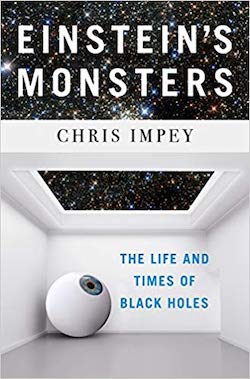On being over my head in a black hole
My grasp of science, at this point, is fairly pathetic. What little I understood in high school is basically gone by now. For me, science is pretty much a matter of faith. I take it as a matter of course that people who are smarter than me — people who have devoted their lives to science — know what they're doing, and I follow their advice on topics like climate change and vaccination.
I know that my phone works when I want it to. I know that we have satellites in orbit around the planet and an awesome well-digging robot on Mars. Do I know how we did any of it? No. I only have a rudimentary understanding of scientific advancements: basically, in my head, I picture science with all the nuance of a child's crayon scrawling. That's what our species's tendency toward specialization is all about — or so scientists tell me.
That said, I love to dabble in scientific books. Reading about science feels, to me, like a calisthenics of the mind: I can stretch my brain and try out some concepts that would never have occurred to me otherwise. The secret to reading science books, for me, is the understanding that I'm not going to understand everything that I read. I'm just kind of forcing my way through the book and coming to terms with the fact that, unlike most books that I read, comprehension is not always possible.
This is a long way of saying that I'm not reviewing Chris Impey's book Einstein's Monsters: The Life and Time of Black Holes. I'm not reviewing it because I didn't understand all of the book — my guess is I only really got about 65 percent of it.

This is not Impey's fault. He's a clear and straightforward narrator, and his explanations will definitely make sense for a general audience. But there were parts of this book that I skimmed because my poor dumb lit-drunk brain simply couldn't absorb the information properly.
So why would I bother reading a book that I'm constitutionally unable to understand? It's because science writing is so abstract that I'm able to appreciate the poetry in it. Impey tosses off facts that are so gorgeous and so difficult to grasp that they're practically poetic imagery. Consider:
- "The farther away a galaxy is, the faster it's receding; in fact, every galaxy is moving away from every other galaxy."
- "As a star evolves it keeps a delicate balance between gravity, which is always pulling inward, and pressure from fusion reactions, which pushes outward."
- "Normally these pairs of particle and antiparticle, or pairs of photons, disappear with no effect. But close to the event horizon of a black hole, intense gravity can pull the virtual pairs apart. One falls in and the other flies away and becomes real."
- "They've weighed black holes by the thousand. This research has taken away black holes' shock and awe, and given them an air of inevitability — which doesn't make them any less amazing."
- "Think of black holes colliding as a gravity bell ringing."
Impey leaves a trail of delicious metaphors throughout Monsters — a long line of bells and corks bobbing in the water and elevators hurtling through space. The message behind those metaphors might be lost on me, but the metaphors themselves are beautiful. For some people, at some times in their lives, the search for truth is more important than the truth itself.